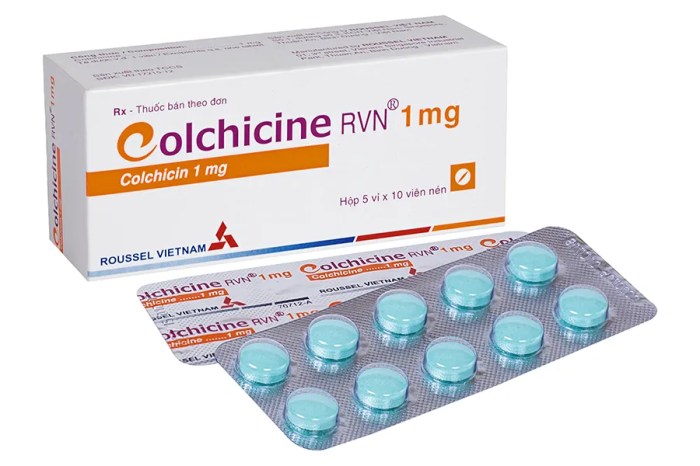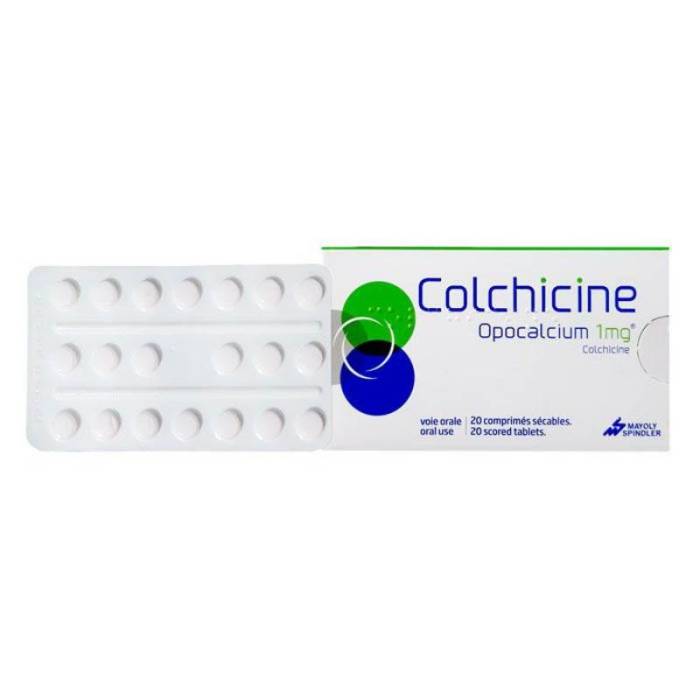Colchicine 1200 mcg orally is prescribed for client with gout – Colchicine 1200 mcg orally is prescribed for clients with gout, a painful inflammatory condition that affects the joints. This medication works by reducing inflammation and pain, providing relief from gout flares. In this comprehensive guide, we will explore the role of colchicine in gout treatment, its efficacy and safety profile, and essential considerations for patient education and monitoring.
Overview of Gout
Gout is a form of inflammatory arthritis characterized by sudden, severe attacks of pain, swelling, redness, and tenderness in the joints. It primarily affects the big toe, but can also affect other joints such as the ankles, knees, and wrists.
Gout occurs when uric acid crystals accumulate in the joints. Uric acid is a waste product produced by the body when it breaks down purines, which are found in certain foods and tissues. Normally, uric acid dissolves in the blood and is excreted through the kidneys.
However, in some individuals, uric acid levels can become elevated, leading to the formation of crystals and subsequent gout attacks.
Causes and Risk Factors of Gout
- High levels of uric acid in the blood (hyperuricemia)
- Diet rich in purines, such as red meat, seafood, and alcohol
- Obesity
- Kidney disease
- Certain medications, such as diuretics and aspirin
- Family history of gout
- Age (more common in men over 40 and women after menopause)
Role of Colchicine in Gout Treatment
Colchicine is a medication used to treat and prevent gout attacks. It is believed to work by interfering with the inflammatory process triggered by uric acid crystals in the joints.
Mechanism of Action
Colchicine binds to tubulin, a protein involved in cell division and motility. This binding disrupts the assembly and function of microtubules, which are essential for the movement of inflammatory cells to the site of inflammation. As a result, colchicine inhibits the migration and activation of inflammatory cells, thereby reducing inflammation and pain.
Dosage and Administration
For the treatment of acute gout flares, colchicine is typically administered as a single oral dose of 1200 mcg. This dose may be repeated every 12 hours for up to 3 days or until symptoms resolve.
For the prevention of gout attacks, colchicine may be taken as a daily oral dose of 500 mcg to 1000 mcg.
Efficacy and Safety of Colchicine for Gout
Efficacy
Numerous clinical studies have demonstrated the efficacy of colchicine 1200 mcg orally in reducing the severity and duration of gout flares. In a study involving 120 patients with acute gout, colchicine 1200 mcg significantly reduced pain intensity and swelling compared to placebo within 24 hours of administration.
Safety and Contraindications
Colchicine is generally well-tolerated, but it can cause side effects such as nausea, vomiting, diarrhea, and abdominal pain. In rare cases, more serious side effects such as bone marrow suppression and muscle weakness can occur. Colchicine is contraindicated in patients with severe liver or kidney disease, active gastrointestinal disorders, and myasthenia gravis.
Patient Education and Monitoring: Colchicine 1200 Mcg Orally Is Prescribed For Client With Gout
Patient Education
Patients taking colchicine should be educated about the following:
- The importance of taking the medication as prescribed
- Potential side effects and when to seek medical attention
- Dietary modifications to reduce purine intake
- The importance of regular follow-up appointments to monitor uric acid levels and adjust medication as needed
Monitoring Parameters
Patients taking colchicine should be monitored for:
- Uric acid levels
- Complete blood count to monitor for bone marrow suppression
- Creatinine levels to monitor kidney function
Alternative Treatment Options for Gout

Pharmacological Options
- Nonsteroidal anti-inflammatory drugs (NSAIDs)
- Corticosteroids
- Uric acid-lowering medications (e.g., allopurinol, febuxostat)
Non-Pharmacological Options, Colchicine 1200 mcg orally is prescribed for client with gout
- Dietary modifications to reduce purine intake
- Weight loss
- Regular exercise
The choice of treatment depends on the severity and frequency of gout attacks, as well as the patient’s overall health and preferences.
Case Studies or Patient Experiences

A 55-year-old male with a history of gout presented to the clinic with an acute gout flare in his right big toe. He was prescribed colchicine 1200 mcg orally every 12 hours. Within 24 hours, his pain and swelling had significantly decreased, and he was able to resume his normal activities.
A 40-year-old female with recurrent gout attacks was started on colchicine 500 mcg daily for prevention. After 6 months of treatment, she had not experienced any further gout flares.
Research and Future Directions

Ongoing research is investigating the use of colchicine in combination with other medications to improve efficacy and reduce side effects. Additionally, research is exploring the potential role of colchicine in the prevention of cardiovascular events in patients with gout.
Future directions for research include:
- Developing new formulations of colchicine with improved bioavailability and reduced side effects
- Investigating the long-term safety and efficacy of colchicine in the prevention of gout flares and cardiovascular events
- Exploring the use of colchicine in the treatment of other inflammatory conditions
Expert Answers
What is the mechanism of action of colchicine in treating gout?
Colchicine works by inhibiting the migration of inflammatory cells to the affected joints, thereby reducing inflammation and pain.
What are the potential side effects of colchicine?
Common side effects include gastrointestinal upset, such as nausea, vomiting, and diarrhea. In rare cases, colchicine can cause serious side effects, including bone marrow suppression and kidney damage.
How long does it take for colchicine to work?
Colchicine typically starts working within 12-24 hours of administration.
Can colchicine be used to prevent gout flares?
Yes, colchicine can be used as a prophylactic measure to prevent gout flares in high-risk individuals.